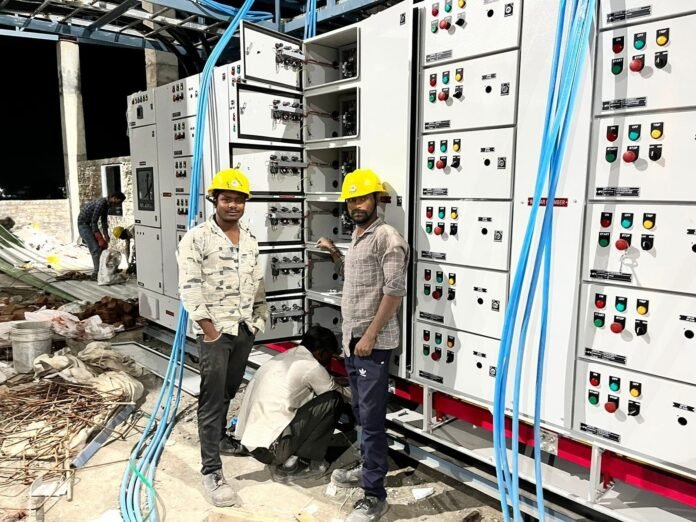Electrical panels are the heart of any electrical system, acting as the central hub where power is distributed throughout a building. Ensuring that your electrical panel is functioning properly is crucial for the safety and efficiency of your electrical system. However, like any other component, electrical panels can experience issues over time. In this article, we will discuss some of the most common electrical panel problems and provide guidance on how to fix them.
Frequent Circuit Breaker Tripping
One of the most common issues with electrical panels is frequent circuit breaker tripping. This typically occurs when the electrical load exceeds the capacity of the circuit. Several factors can contribute to this problem, including:
- Overloaded Circuits: This happens when too many devices are connected to a single circuit.
- Short Circuits: A short circuit occurs when a hot wire comes into contact with a neutral or ground wire.
- Ground Faults: These happen when a hot wire touches a ground wire or a metal outlet box.
Solution: To address this issue, first, identify the circuit that is tripping and unplug some devices to reduce the load. If the problem persists, it may indicate a short circuit or ground fault, which should be inspected and repaired by a professional electrician. Regular maintenance and inspection of your electrical panel can help prevent these issues.
Flickering or Dimming Lights
Flickering or dimming lights can be a sign of a problem within your electrical panel. This issue can be caused by:
- Loose Wiring: Loose connections can cause intermittent power supply to lights and other devices.
- Faulty Circuit Breakers: Old or worn-out breakers can fail to maintain a steady flow of electricity.
- Voltage Fluctuations: Unstable voltage supply can lead to flickering lights.
Solution: If you notice flickering or dimming lights, check for loose wiring connections in the affected circuit. Tighten any loose wires and replace any damaged ones. If the problem persists, it might be due to a faulty circuit breaker, which should be replaced. In cases of voltage fluctuations, contact your utility company to ensure there are no issues with the external power supply.
Warm or Hot Electrical Panel
An electrical panel that feels warm or hot to the touch is a serious concern and indicates potential overheating. Common causes include:
- Overloaded Circuits: Excessive load on circuits can cause overheating.
- Loose or Corroded Connections: These can create resistance, leading to heat build-up.
- Faulty Components: Old or damaged breakers and other components can overheat.
Solution: If you discover your electrical panel is hot, immediately turn off the main power supply and contact a licensed electrician. They will inspect the panel for any loose or corroded connections and replace any faulty components. Regular inspection and electrical panel testing services can help prevent overheating and ensure the safety of your electrical system.
Rust or Corrosion
Rust or corrosion inside your electrical panel is a sign of moisture intrusion, which can compromise the safety and functionality of your electrical system. Common sources of moisture include:
- High Humidity: Prolonged exposure to high humidity levels can lead to rust and corrosion.
- Water Leaks: Leaks from plumbing pipes or roofs can cause water to enter the electrical panel.
Solution: To address rust or corrosion, identify and fix the source of moisture. This may involve repairing leaks or improving ventilation to reduce humidity. Once the moisture issue is resolved, have an electrician inspect the panel and replace any rusted or corroded components to restore the system’s integrity.
Outdated or Insufficient Panel Capacity
Older electrical panels may not have the capacity to handle the electrical demands of modern households or businesses. This can lead to various problems, such as frequent breaker tripping or insufficient power supply.
Solution: If you suspect your panel is outdated or insufficient, consider upgrading to a modern panel with higher capacity. This involves installing a new panel that can handle the increased load and meet current safety standards. For professional assistance, consider transformer installation services in India to ensure your electrical system is up to date and capable of meeting your needs.
Buzzing or Humming Sounds
Buzzing or humming sounds coming from your electrical panel can be a sign of an underlying issue. These sounds may be caused by:
- Loose Wires: Loose connections can cause arcing, which produces a buzzing sound.
- Faulty Breakers: Worn-out or malfunctioning breakers can create noise.
- Electrical Arcing: This occurs when electricity jumps between connections, producing a humming noise.
Solution: If you hear buzzing or humming sounds, turn off the power to the affected circuit and inspect for any loose wires. Tighten any loose connections and replace any faulty breakers. If the noise persists, contact a professional electrician to conduct a thorough inspection and address any potential issues.
Conclusion
Electrical panel problems can pose significant safety risks if not addressed promptly. Regular maintenance, inspection, and timely repairs are essential to ensure the proper functioning of your electrical panel. If you encounter any of the common issues mentioned above, it is crucial to take immediate action and seek professional assistance when necessary. By staying vigilant and proactive, you can ensure the safety and efficiency of your electrical system, preventing potential hazards and costly repairs.



